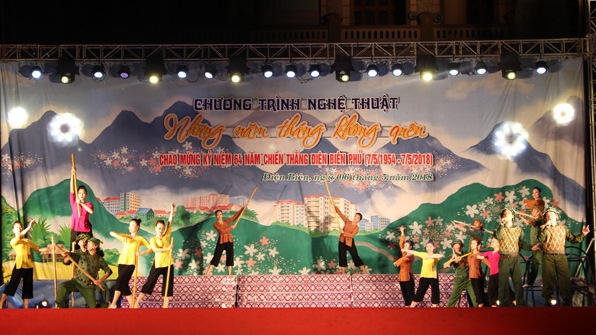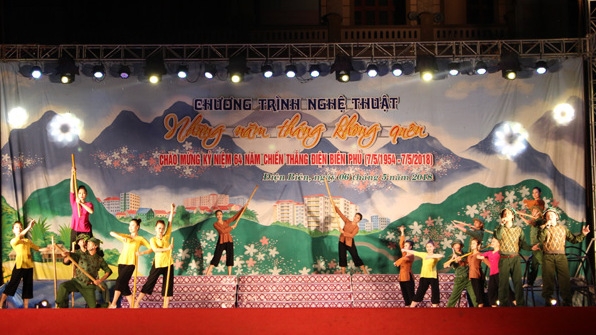
An art programme entitled "Unforgettable Days” was held in the northern province of Dien Bien, where the battle of Dien Bien Phu took place 64 years ago, to celebrate the victory that ousted the French from Vietnam.

The gala performance to mark the 64th anniversary of Dien Bien Phu Victory (Source: Bao Dien Bien Phu).
Songs and
dances were performed to celebrate the previous generations’ heroic struggles
and sacrifices to secure a triumph which was described as having resonated
across the five continents and shook the world.
With the participation of nearly 100 singers and dancers,
the gala night brought the audience back to a historic period of the nation.
Earlier at the A1 Cemetery for Fallen Soldiers, a
candlelit vigil was held to pay tribute to those who have died for national
independence.
The cemetery was built in 1958 roughly 100 metres south
of the A1 Hill, where the battle took place.
On May 7, 1954, Vietnam
secured a final victory over the French at Dien Bien Phu, forcing them to sign
the Geneva Accords on restoring peace in Vietnam
and ending nearly 100 years of French colonial rule in Vietnam.
Source: NDO
With an increasingly vibrant and widespread emulation movement aimed at building cultured residential areas and cultured families, Yen Thuy District has been making steady progress toward improving both the material and spiritual well-being of its people, while fostering a civilized, prosperous, beautiful, and progressive community.
Once lacking recreational spaces and community facilities, Residential Group 2 in Quynh Lam Ward (Hoa Binh City) has recently received attention for the construction of a new, spacious, and fully equipped cultural house. The project followed the model of state support combined with public contributions in both labor and funding.
The "All people unite to build cultural life" movement, which has been effectively integrated with Kim Boi district’s socio-economic development goals, is fostering a lively spirit of emulation across local residential areas, hamlets, villages, public agencies, and enterprises. In addition, through the initiative, traditional cultural values are being preserved and promoted, while community solidarity and mutual support in poverty reduction and economic development are being strengthened.
A working delegation of the Hoa Binh provincial People’s Committee led by its Permanent Vice Chairman Nguyen Van Toan on June 11 inspected the progress of a project to build the Mo Muong Cultural Heritage Conservation Space linked to tourism services in Hop Phong commune, Cao Phong district.
Born and growing in the heroic land of Muong Dong, Dinh Thi Kieu Dung, a resident in Bo town of Kim Boi district, in her childhood was nurtured by the sweet lullabies of her grandmother and mother. These melodies deeply imprinted on her soul, becoming an inseparable part of her love for her ethnic group's culture. For over 20 years, this love for her hometown has driven Dung to research, collect, and pass down the cultural values of the Muong people to future generations.
In the final days of May, the Ethnic Art Troupe of Hoa Binh Province organized performances to serve the people in remote, mountainous, and particularly disadvantaged areas within the province. These were not just ordinary artistic shows, but they were the meaningful journeys aimed at spreading cultural values, enhancing the spiritual life of the people and contributing to the preservation of ethnic minority cultural identities.



